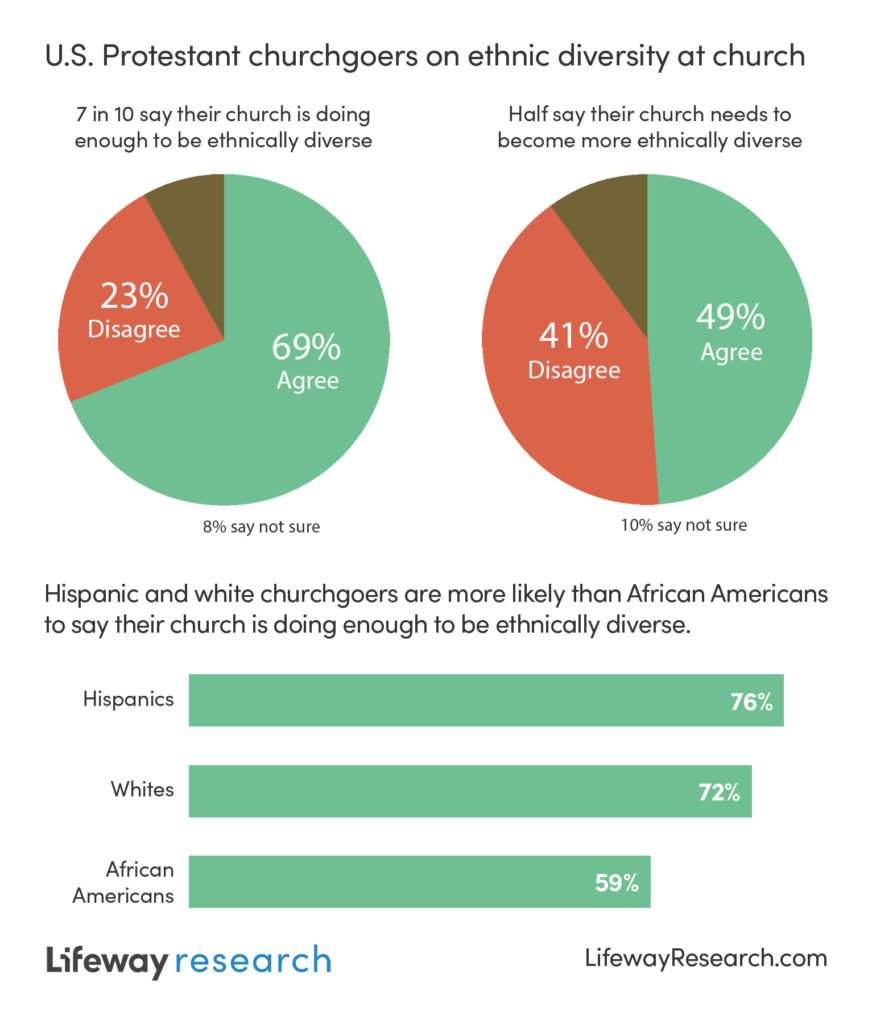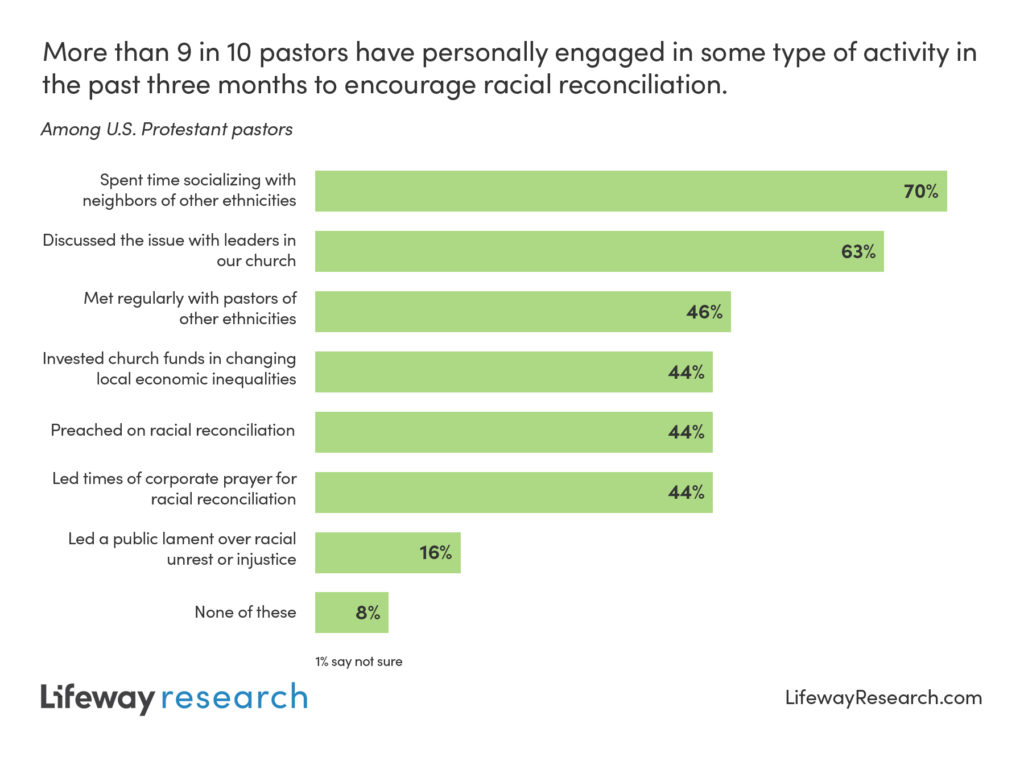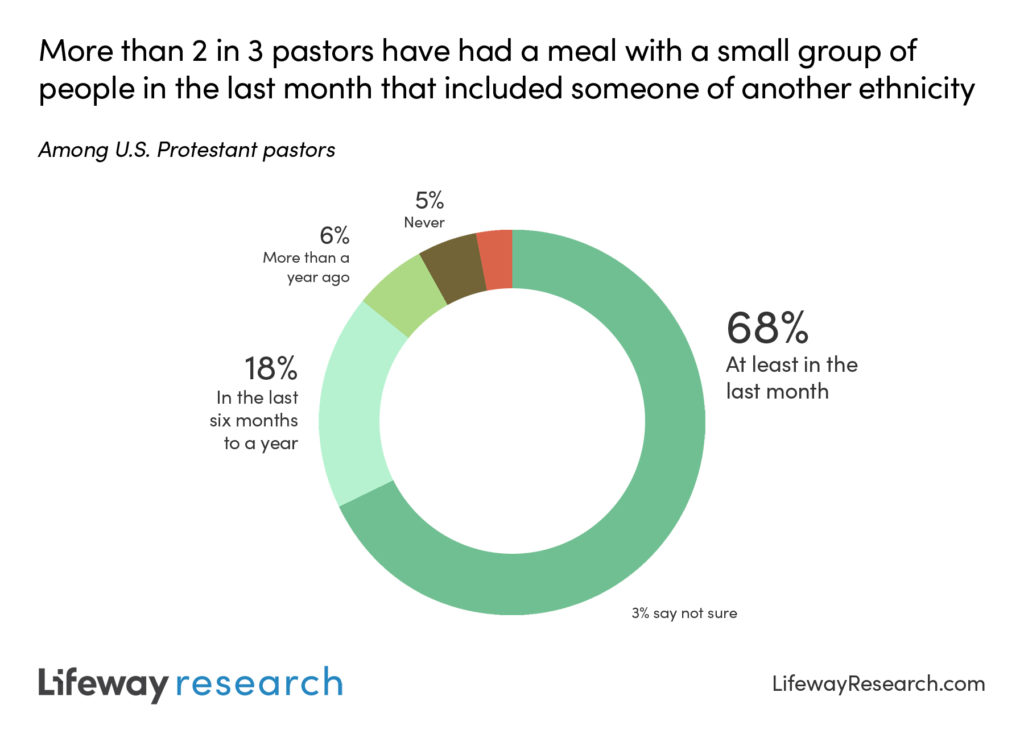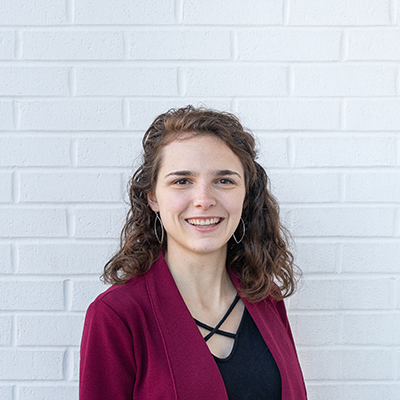
U.S. Protestant pastors are doing more to encourage racial reconciliation. Still, half of churchgoers want more ethnic diversity in the church.
By Marissa Postell Sullivan
Although pastors are doing more to encourage racial reconciliation and churchgoers say their church is doing enough to be ethnically diverse, nearly half of churchgoers say their church needs to become more ethnically diverse.
In a survey of American churchgoers, 49% say their church needs to become more ethnically diverse, including 18% who strongly agree. At the same time, nearly 7 in 10 say their church is doing enough to be ethnically diverse (69%).
“When a church is largely one ethnicity, making progress toward ethnic diversity is not easy. Yet that doesn’t mean many of these churches are not trying,” said Scott McConnell, executive director of Lifeway Research.

For some, these two things are connected. African American churchgoers (60%), churchgoers who attend a worship service one to three times a month (56%), and those without evangelical beliefs (57%) are the most likely to say their church needs to become more ethnically diverse. And these groups are among the least likely to say their church is doing enough to be ethnically diverse. Nearly 3 in 5 African American churchgoers (59%) say their church is doing enough to be ethnically diverse. Nearly 2 in 3 churchgoers who attend one to three times a month (64%) and those without evangelical beliefs (66%) say the same.
Denominationally, Methodist (90%) and Restorationist movement (71%) churchgoers are most likely to agree their church needs to become more ethnically diverse. And Baptists (62%) and Lutherans (58%) are among the least likely to agree their church is doing enough to be ethnically diverse.
49% of U.S. Protestant churchgoers say their church needs to become more ethnically diverse. At the same time, (69%) say their church is doing enough to be ethnically diverse. Click To TweetAge and gender are also factors in a person’s perception of ethnic diversity in the church. The youngest adult churchgoers—those age 18-34 (63%) and 35-49 (63%)—are more likely than those 50-64 (46%) and over 65 (33%) to agree their church needs to become more ethnically diverse. And females (65%) are less likely than males (73%) to say their church is doing enough to be ethnically diverse.
Pastoral leadership in racial reconciliation
Lifeway Research asked U.S. Protestant pastors about their engagement in a variety of practices to encourage racial reconciliation. In the past three months, most pastors have discussed racial reconciliation with leaders in their church (63%) and spent time socializing with neighbors of other ethnicities (70%). More than 2 in 5 have led times of corporate prayer for racial reconciliation (44%), preached on racial reconciliation (44%), invested church funds in changing local economic inequalities (44%), and met regularly with pastors of other ethnicities (46%). Fewer have led a public lament over racial unrest or injustice in the past three months (16%). And 8% of pastors said they had not engaged in any of these activities to encourage racial reconciliation.

Compared to a 2016 Lifeway Research study, more pastors are socializing with neighbors of other ethnicities (70% v. 57%), discussing the issue with church leaders (63% v. 51%), meeting regularly with pastors of other ethnicities (46% v. 40%), and investing church funds in changing local economic inequalities (44% v. 31%). However, fewer pastors today are leading times of corporate prayer for racial reconciliation (44% v. 53%) or leading public laments over racial unrest or injustice (16% v. 20%).
“It’s encouraging to see pastors increasingly engaged in many activities that foster racial reconciliation,” McConnell said. “Perhaps the most surprising is the growth in the number of churches engaged financially in righting economic inequalities.”
Factors in racial reconciliation engagement
Demographics such as age and ethnicity are factors in a pastor’s likelihood of engaging in some of these activities. Pastors over 65 (60%) are the least likely to socialize with neighbors of other ethnicities, while Hispanic pastors are among the most likely (82%). Pastors over 65 are also the least likely to meet regularly with pastors of other ethnicities (35%). African American pastors are the most likely to invest church funds in changing local economic inequalities (65%) and among the most likely to lead a public lament over racial unrest or injustice (34%).
Mainline pastors are more likely than evangelicals to engage in many of these practices. Mainline pastors are more likely than evangelical pastors to invest church funds in changing local economic inequalities (55% v. 41%), discuss the issue with leaders in the church (72% v. 59%), preach on racial reconciliation (55% v. 40%), lead a public lament over racial unrest or injustice (20% v. 12%), or lead corporate prayer for racial reconciliation (55% v. 41%).
When it comes to preaching on racial reconciliation, pastors in the Midwest are least likely to have preached on the topic in the last three months (36%). And pastors with doctoral degrees are among the most likely to have preached on racial reconciliation (51%).
Denominationally, Methodist (65%) and Presbyterian/Reformed (64%) pastors are more likely than Baptist (34%), Lutheran (36%), Pentecostal (44%), Restorationist movement (38%) or non-denominational (38%) pastors to invest church funds in changing local economic inequalities.
Pastoral leadership in breaking bread together
Lifeway Research also asked when Protestant pastors last had a meal with fewer than 10 people that included someone of another ethnicity. More than 2 in 5 (41%) say they had done so in the last week, and 27% had done so in the last month. Another 13% had eaten a meal with a small group of people that included someone of another ethnicity in the last six months. Few had only done so in the last year (5%), more than a year ago (6%) or never (5%). And 3% were not sure.
Compared to 2016, pastors today are less likely to have had a small group meal with someone of another ethnicity in the last six months (81% v. 88%).

“It is possible that COVID-19 broke some habits of pastors dining with people of other ethnicities,” McConnell said. “Two groups whose churches were closed the longest during the pandemic, African American and mainline pastors, also have a few more pastors who haven’t had a meal with someone of another ethnicity in the last year.”
Younger pastors—18-44 (47%) and 45-54 (47%)—and those in the West (54%) are among the most likely to say that in the last week they’ve had a meal with a small group that included someone of a different ethnicity. Pastors with no college degree (29%) and pastors of churches with attendance fewer than 50 (32%) are the least likely to say they’ve done so in the last week. And pastors of the smallest churches (11%), African American pastors (15%) and mainline pastors (10%) are the most likely to say it’s been more than a year since they’ve had dinner with someone of a different ethnicity in a small group setting.
For more information view the complete churchgoer and pastor reports and visit LifewayResearch.com.
Lifeway Research studies can be used and referenced in news articles freely. This news release can also be republished in its entirety on other websites and in other publications without obtaining permission.

Methodology
Lifeway Research conducted the online survey of 1,002 American Protestant churchgoers Sept. 19-29, 2022, using a national pre-recruited panel. Respondents were screened to include those who identified as Protestant/non-denominational and attend religious services at least once a month. Quotas and slight weights were used to balance gender, age, region, ethnicity, education and religion to more accurately reflect the population. The completed sample is 1,002 surveys. The sample provides 95% confidence that the sampling error does not exceed plus or minus 3.3%. This margin of error accounts for the effect of weighting. Margins of error are higher in sub-groups.
Lifeway Research conducted the phone survey of 1,000 Protestant pastors Sept. 6-30, 2022. The calling list was a stratified random sample, drawn from a list of all Protestant churches. Quotas were used for church size. Each interview was completed by the senior or sole pastor or a minister at the church. Responses were weighted by region and church size to more accurately reflect the population. The completed sample is 1,000 surveys. The sample provides 95% confidence that the sampling error does not exceed plus or minus 3.2%. This margin of error accounts for the effect of weighting. Margins of error are higher in sub-groups. Comparisons are made to a phone survey of 1,000 Protestant pastors conducted by Lifeway Research Aug. 22-Sept. 16, 2016.
Evangelical Beliefs are defined using the NAE Lifeway Research Evangelical Beliefs Research Definition based on respondent beliefs. Respondents are asked their level of agreement with four separate statements using a four-point, forced choice scale (strongly agree, somewhat agree, somewhat disagree, strongly disagree). Those who strongly agree with all four statements are categorized as having Evangelical Beliefs.
- The Bible is the highest authority for what I believe
- It is very important for me personally to encourage non-Christians to trust Jesus Christ as their Savior
- Jesus Christ’s death on the cross is the only sacrifice that could remove the penalty of my sin
- Only those who trust in Jesus Christ alone as their Savior receive God’s free gift of eternal salvation







